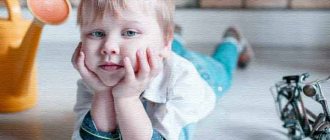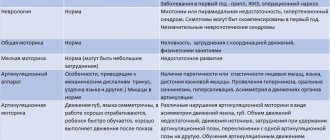Good afternoon, dear parents. Are you concerned that your child is not speaking at 2 years old? Today there is an opinion that boys and girls at the age of two should already be able to speak and express themselves properly with others.
That is, if for some reason the toddler, having passed the age of two, is still silent or makes some inarticulate sounds, then it means that he has a clear deviation from the norm.
All kids are different
However, such a judgment, inherent in supporters of early development, is not supported by anything, because it has long been known that each person, and, therefore, a child, is individual with his own characteristics and, therefore, the stages of development in children proceed completely differently.
A clear example can be seen when your baby starts teething at just one year old, and your neighbor’s child starts teething at just six months. It is unlikely that any parent will panic about this.
Indeed, what’s wrong if a baby’s teeth erupt earlier or later than other babies? This principle also applies to the development of speech in little people.
Because the child’s development, regarding any aspect, also occurs not according to established frameworks, but to the best of the child’s ability.
Nevertheless, parents, like no one else, influence the upbringing and development of their son or daughter. They are the ones who contribute to how well the baby will learn skills, gain knowledge, and, in fact, master speech.
If a child does not speak at 2 years old
To do this, teachers recommend that mothers and fathers, literally from the birth of the baby, talk to him, clearly pronouncing the words. Various cards (Doman cards) can also help, where a specific object with a name is drawn.
Parents should show their son or daughter a picture and say the word that is written under it.
But supporters of somewhat classical education recommend that parents teach their child to talk at the following moments:
- When it becomes clear that the baby is trying to say something and is actively gesturing at the same time;
- If the baby really understands adults and what they are talking about, but for some reason refuses to repeat after them;
- When the baby babbles to himself and can pronounce sounds.
Many parents wonder why a child does not speak at 2 years old and categorically does not repeat words after them or does not comply with the simplest requests “get dressed” or “lie down”?
This may be connected both with a violation of the child’s health and with his elementary character.
In the second case, a child who understands everything, but does not utter words, just “accumulates” everything in himself and the parents can only wait; most likely, the baby will speak suddenly.
By the way, those children who begin to speak later than two years old very often outstrip their peers and chatter so much that sometimes they cannot stop.
A 1.5 year old child is silent, but understands everything.
Sections
Question to the speech therapist:
Dear Anna Vladimirovna! I really count on your consultation on this issue: My daughter is already one and a half years old, she says the only word “HELLO” (hello), and not often. Not “mom”, not “dad”, not “baba” - nothing! She doesn’t say “give me”, and doesn’t ask for anything at all - neither food nor drink; if necessary, she tries to get it herself (and this is rare, mostly she just starts being capricious, and I can already guess what’s going on). Does not repeat after us, does not imitate animal sounds (moo, woof, woof, etc.). At the same time, the child hears well, because he responds to the name, even if I call from the next room, he runs towards the sound of the TV, and is frightened by sharp sounds (at the neighbor’s house, when the walls are being drilled, he begins to cry). The meaning of the words “on”, “give”, “cannot” is understood perfectly. Speech development lags behind from birth - babbling after 3 months, and even then rather scantly, syllables and babbling after 10 months. Can't stand finger games, pulls his hand away and leaves. Since he was a year old, we have been developing fine motor skills - sorting (touching and scattering) cereals, pasta, beads and buttons. He loves books and listens willingly (bright pictures and several lines of text on a page; if there is more text than pictures, he turns to another page). Somewhere after a year, speech activity appeared in the form of gibberish (nothing meaningful, and most importantly, not even a “gibberish” word was assigned to any of the objects or actions). True, sometime after 11 months, my daughter clearly pronounced “A-a-a” when sitting on the potty. Then that too disappeared. Now the only conscious sound in use is “ALYO”, while imitating a conversation on the phone (pressing his hand to his ear) and then uttering another tirade of incomprehensible sounds. He doesn’t address us in any way (only when he cries, he can say ma-ma-ma-ma), but in response to the question “Where is mom (dad, brother, cat)?” turns his head towards the person he is looking for. Emotionally safe, laughs, rejoices at family and friends, gets offended, cries - everything in time. I have already tortured our neurologist, we have completed three rehabilitation courses (she was born premature, at 33 weeks, she was slightly behind in motor development, but by the age of one year she had caught up with her peers), now we are in line for the next one (massage of the speech zones, paraffin, laser for the same speech zones). Maybe you really shouldn’t worry, but just wait? But it’s so scary to miss time, because sometimes not everything can be restored precisely because of inaction. I had high hopes for the kindergarten (everyone claims that our girl will start talking there), but with the kindergarten we, as they say, flew by. Now I’m looking for advice from a professional specialist, and not advice from grandmothers on the bench. Thanks in advance, I really hope for an answer. (Ekaterina)
Answer: Dear Ekaterina, you did the right thing by starting to sound the alarm earlier. Judging by your letter, the girl really has problems with speech, which can and should begin to be eliminated even at such an early age.
You write that the child had a delay in speech development at an early age. The delay in humming, its lack of intonation, the delay in the babbling phase, its failure to address an adult - all these signs are symptoms of speech disorders. The poverty of intonation (from the Latin “to pronounce loudly”, a complex complex of prosodic elements including melody, tempo, timbre, rhythm, intensity and logical stress at the sentence level to express various syntactic meanings and categories, as well as expressions and emotions) is sometimes compensated by the expressiveness of facial expressions , eye. And in your case, the girl resorts to whims, by the intonation of which the mother is able to understand what the child wants at the moment.
The vocabulary of such children accumulates slowly; the first words may appear by three to five years (normally by 1.5 years). Speech in this case is characterized by slurredness, crumpledness, ungrammaticality, and convolutedness.
Continue to develop fine motor skills of the hands, because the centers responsible for hand movement and articulatory movements (lips, tongue, lower jaw, soft palate) are located in the cerebral cortex in the immediate vicinity of each other, therefore massaging and developing the fingers, thereby promoting and the development of articulatory motor skills. If your daughter cannot tolerate finger games such as “Magpie-White-sided”, “Ladushki”, etc., turn to more advanced types of games. Start painting with finger paints, both with your fingers and with your entire palm. Start sculpting with salt dough; it is less toxic for young children, who are eager to try everything on their tongue. I can also recommend games with finger puppets and thimble dolls; this activity is very exciting for young children. Undoubtedly, it is necessary to find a good speech therapist to work with the child, who will help establish emotional contact between you and your girl, promoting the development of the baby’s active speech.
You write about the girl’s reluctance to repeat words and sounds after adults, or imitate the sounds of animals. It is speech imitation that is the most important and effective technique in working with non-speaking children. This is a natural period in the development of children's speech, both normally and in the case of speech disorders.
It is necessary to create conditions in which the child will have a desire to pronounce (repeat) the same sound combinations repeatedly. To do this, you need to establish emotional contact with the child (play the “simplest” games with the baby, which will bring her into a state of activity - physical, fun - emotional and peace - mental), place him in a situation of success (praise him, even for the slightest achievements, if the child did not answer your question, say that he did well, because he tried his best, next time he will definitely succeed).
Imitating the speech of an adult occurs in several stages: - Repetition of amorphous words . These are the very sounds and syllables that carry meaning in a child’s speech (oo-oo-oo, zh-zh-zh, aw-aw, bi-bi, buh, meow, yum-yum, doo-doo, kup-kup , glug-glug, etc.). In addition to correctly pronounced simple words, such as mom, dad, give, na, etc., “abnormal words” may also be present. They are divided into fragment words (for example, milk - “moko”, car - “sina”), onomatopoeic words (for example, am-am - eat, top-top - walk, mud-cow, meow - cat, bang - fell, etc.) and contour words in which the stress and number of syllables are correctly pronounced (for example, “tititiki” - bricks, “patina” - car, “mapata” - shovel). Also, children’s speech may contain words that do not at all resemble the words of their native language or their fragments (in this letter they are called gibberish). Such autonomous speech of a child cannot be reinforced and supported. Also, you should not repeat after the child the substitute words he reproduces; the adult should give the child examples of CORRECT speech. - Repetition of words. At the beginning these are short words, such as: mom, dad, give, na, kitty, duck, etc. At this stage, it is possible to use “light words” in speech (not cat, but kitty). Particular attention should be paid to the child’s mastery of verbs, because They play an important role in the development of children's speech: the more words-actions, the higher the level of its development in the child. - Repeating short phrases. This is the stage of combining several words in one sentence (at the initial stage - 2-3 words). For example, Here is a spoon. There's a ball there. Where's mom?
Games for the development of speech imitation.
- Listen to a poem about an airplane: We’ll build the airplane ourselves, Let’s fly over the forests, Let’s fly over the forests, And then we’ll return to mom.
Let's play airplanes! The planes flew into the sky and buzzed: “U-U-U!” With our arms straight out to the sides, we run around the room, accompanying our movements with the pronunciation of a long continuous sound U.
Similar to this game, we play “Steam Locomotives” (tu-tu), “Steamboats” (s-s-s), “Cars” (zh-zh), etc. And also adapt any other children's poems by adding simple amorphous words (boom, bom-bom, bi-bi, gop-gop, mur-mur, oh-oh-oh, ay-ay-ay, jump-jump, la- la-la, etc.)
In conclusion, I would like to add that on my blog I posted an article entitled “Let’s talk to the “silent” from 1.5 to 3 years old”, I talked about the need for constant communication with the child. I would like to give some ambiguous advice: you need to talk a lot, but not enough, i.e. The adult communicates with the child constantly, but at the same time uses short phrases of 2-4 words in his speech. But the speech therapy joke “Repetition is the mother of stuttering” is not appropriate here, because It is repeated repetition, repeated utterance of everyday situations or artificially created ones (games, activities) that will bring a positive result.
This is roughly how your conversation with your child should be structured:
Washing.
- Let's go wash up. Let's open the tap. No, not this way, the other way. Like this. Where's the soap? Here's the soap. Take soap and wash your hands. Put the soap in the soap dish. Let me help you. Three hands good. Now let's wash off the soap. Place your hands under the water - like this. Now let's wash our face - like this. Take water into your palms and rub your face. Close the tap. Where's the towel? Take a towel and dry your face and hands. Well done! Look how clean it has become.
Let's build a house.
- Look what cubes we have. Show me where the red cube is? That's right, here it is. Where's the yellow one? Where's the blue cube? Right here. Let's build a house out of cubes. What kind of house will it be - big or small? Show me. Big? Fine. Here I placed the cube. Now you bet. put it here...
I wish you patience, imagination and success.
Sincerely, Anna Arnautova.
Consultant's response published 07/13/2009
speech therapist →
Speech development of a two-year-old child
But in no case should you take the development of speech in children lightly and rely only on your own strengths and capabilities. You should definitely conduct a medical examination of your baby for possible diseases.
Because if hearing impairment is the reason for the silence of a son or daughter, then this problem must be addressed as early as possible.
After all, the sooner the cause of speech development disorders is identified, the sooner it can be solved, and the child will continue to develop, like all children of his age.
Despite the fact that mothers and fathers are the best helpers in mastering a child’s speech, unfortunately, it is not uncommon for them to be the reason for a two-year-old child’s inability to speak.
This happens due to the fact that parents prefer not to turn off the TV or simply leave the baby in front of it, they say, let him learn to speak by looking into the “box”.
But this decision is fundamentally wrong, since the baby perceives only the general background noise on the TV, but not individual words. Moreover, if the baby gets used to listening to his favorite music on TV, then, obviously, it will be almost impossible for the baby to understand the words in it.
Therefore, when you are developing your child’s speech, you should definitely turn off any background devices so that nothing can distract you and your child from mastering words.
How to teach a child to speak at 2 years old
Be that as it may, if you decide to develop your baby’s speech from the cradle, then you need to talk about the following.
It has now been established that developed finger motor skills in children directly affect speech development.
Therefore, you should develop the motor skills of your baby’s fingers from an early age. To do this, beads, ribbons, ties and the usual tearing of paper piece by piece will come to the rescue. In addition, you need to massage each finger of the baby.
A fingertip performance game will also help you, for which you will have to rely on your imagination and creativity.
When your baby is two years old and does not speak, it is contraindicated to force him to pronounce words and try to train him hard. This method will only cause a negative reaction in the baby, and he will remain stubbornly silent for a long time.
But if your child is silent for the simple reason that you indulge him in everything, give him objects even before he tries to voice his desires, then such a little person, most likely, will also speak fully for a very long time.
Why, if he has no motivation to talk, much less make requests?
Such a child will not only grow up silent, but also capricious, accustomed to constant fulfillment of his demands by his parents.
How to help a child master speech and how to do it correctly?
Why doesn't a child speak at 2 years old?
Neurological diseases are often one of the most common causes of deviations in the speech development of children. These include:
- Damage to the central nervous system and underdevelopment of the brain.
- General hypotonicity (and in particular hypotonicity of the facial muscles).
- Congenital pathologies of the development of the tongue, lips, palate, facial muscles.
Neurological pathologies can lead to severe speech disorders, such as:
- Motor alalia
- Sensory alalia
- Dysarthria
- Aphasia
Motor alalia
This is a disease in which a child may not speak at all, or speak poorly, confusing the endings. At the same time, the child understands what adults are telling him.
The cause of the disease is damage to the speech motor analyzer - Broca's center and its pathways.
Signs of a speech disorder:
- A child of 2 and a half years old does not yet speak. He begins to pronounce his first words at the age of 4 years.
- Builds sentences incorrectly, uses words in the wrong form and case.
- Has a very limited vocabulary.
- Hyperactive or, conversely, sedentary.
- Refuses to communicate with adults and children, does not want to make contact, and is sometimes aggressive.
Sensory alalia
A disease characterized by underdevelopment of impressive speech. When hearing is intact, understanding the speech of others is impaired.
The cause of the disease is damage to the part of the brain responsible for correct speech analysis.
Signs of this pathology:
- Disinhibited speech. The little one is chatting, but the adults don’t understand what he’s saying.
- Low intelligence.
- When communicating with a child, he has difficulty perceiving the speech of others by ear.
- Replacing letters.
- Pronouncing several words together, as a single word.
- Hyperactivity, combined with depression.
Dysarthria
This disease is characterized by an irregular breathing rhythm, a nasal voice, and unclear pronunciation of sounds.
At the physical level, the pathology is manifested by weak tone of the facial muscles. The baby almost cannot lift his tongue up and reach the outer corners of his mouth. The tongue of a child suffering from dysarthria at 2 years old trembles. There is profuse salivation.
The cause of the disease is asphyxia of the brain, genetic predisposition, diseases of the central nervous system.
Aphasia
It is a common reason why a 2.5 year old child does not speak. With this pathology, the child’s speech is distorted: the pronunciation and meaning of phrases are impaired. However, hearing may be normal.
The cause of the disease is head injuries, cancer, complications from infectious diseases.
Physiological reasons
The physiological reasons for the lack of speech at 2 years old include the following problems:
- Hearing impairment.
Any hearing loss has a negative impact on speech development. Children suffering from hearing loss are always lagging behind in speech development. If a child does not speak at 2.5 years old, parents should contact an otolaryngologist and have the child’s hearing checked.
- Underdevelopment of the speech apparatus.
Weakness of the jaw and facial muscles can cause a child of 2 years to not speak. Signs of articulation disorders include increased drooling, a slightly open baby's mouth, and a gag reflex that occurs when trying to swallow solid food. The causes of impaired articulation may be too early weaning, as well as a short frenulum under the tongue.
- Genetic predisposition.
It happens that a child is almost 2 years 9 months old, but he does not speak. At first glance, a healthy baby who does not have any physiological abnormalities may have a genetic predisposition to a delay in speech development.
Perhaps one of the parents or other relatives had the same pathology, and it was inherited by the child. In this case, forcing the child to speak is useless. You can only help him by stimulating his speech development through games and activities.
Psychological reasons
- Often a child at 2 years old does not speak due to lack of need to speak. Adults anticipate all his desires, are overly protective, and he no longer has the need to express his needs to adults. In this case, parents should stop patronizing the child and start stimulating his speech: ask open-ended questions more often, do not rush to satisfy the child’s every desire, he just needs to point to the desired object with his finger.
- A common reason why a child at two years old does not speak is stress or fear of the child. A child can develop normally, and then, after experiencing some kind of stress (separation from mother, moving, illness), take a step back in speech development.
Case from practice: at an appointment with a child psychologist, a mother says that her daughter started talking at 2 years 2 months. However, after she and her husband divorced, the child stopped communicating with loved ones. The girl became silent and “forgot” the words she had previously spoken. Now the child is 2 years 8 months old and she does not speak. In this case, the child clearly experienced stress due to his parents' divorce, which affected his development. When you are stressed, it is important to help get through it as quickly as possible. It is better to contact a child psychologist, who will help the child relieve accumulated tension in a playful way.
- Another psychological reason for not speaking at the age of 2 years may be the lack of proper attention to him. In such families, parents spend little time with their children, communicate little, and do not encourage conversations and joint developmental activities.
Tips for parents
There are several small tips that contribute to the proper development and mastery of words by a child after two years of age and earlier:
- Talk to your baby a lot and constantly, pronouncing the words clearly, without “lisping”;
- While walking, describe in detail to your child what is visible along the way: a tree, a playground, and so on. The child must not only replenish his vocabulary, but also have an understanding of various surrounding objects;
- Say his requests out loud: “Do you want to eat?” or “Should I give you a toy?” Gradually, the baby learns to voice his desires;
- Ask about any little things about your baby, even the most insignificant, but be sure to wait for an answer, without pushing or answering for the baby. Whenever possible, complicate the questions for a longer child's story;
- Any action of the baby should be accompanied by your detailed comments, as well as additional questions;
- Be sure to praise your baby after he masters a new word;
- It is recommended to keep a special diary with the baby’s successes and achievements in mastering new words and phrases to identify trends;
- Teach your baby to click his tongue and other movements that train the tongue, for example, even the usual blowing of soap bubbles.
Again, if the child is already two years old and does not speak, then to solve the problem, teachers advise sending the baby to kindergarten, where communication and being close to peers will quickly lead to the development of the vocabulary and, therefore, to the very appearance of speech.
What to do if the child does not speak
If the child does not have serious pathologies, every parent can help their child start talking. Below are recommendations from experts that will help get the most silent little one talking.
Advice from speech therapists
- Encourage your child to communicate. Try to talk to your baby more. Name the objects you see around you, try to pronounce words to your child slowly and clearly.
- Try to communicate with your child correctly, without distorting words.
- Encourage and praise your baby for any sounds and attempts to pronounce words.
- Ask open-ended questions: who is in the picture? What is the name of this doll? What color is this car?
- Don't rush him to answer. Wait for the baby to answer, do not interrupt him, getting ahead of him with the answer to the question asked.
- Try to read books to your baby more and tell fairy tales. This will enrich his vocabulary and promote speech development.
- Sing simple songs. Humming songs with your baby will also have a positive effect on his speech development.
- Do articulatory gymnastics. Try to spend 10-15 minutes exercising daily. This time will be enough for the baby to learn to control his lips and tongue.
- Teach your baby to breathe correctly. Correct speech breathing will help him learn to correctly pronounce sounds and then words. Speech inhalation must be done through the nose, speech exhalation through the mouth.
But there can be no one hundred percent guarantee!
But it is never, under any circumstances, recommended to compare your child with others and try to identify developmental deviations on your own.
As we have already mentioned above, why a child does not speak at 2 years old - all children do not develop according to established frameworks and rules, but according to their strength and necessity, so rushing them or trying to force them to teach speech is absolutely impossible, otherwise you risk harming the little person.
Of course, all children must be checked by specialists, so if the baby cannot pronounce words at two years old, then to find out “why?”, you need to be checked by a neurologist, who will already prescribe treatment.
But perhaps working with speech therapists and defectologists will help the baby master speech.
Summarizing all of the above, why a child does not speak at 2 years old, we can say that the emergence of speech depends on:
- from the baby's health;
- his upbringing;
- individual characteristics.
With this we will say goodbye to you. Your baby will be talking soon!








